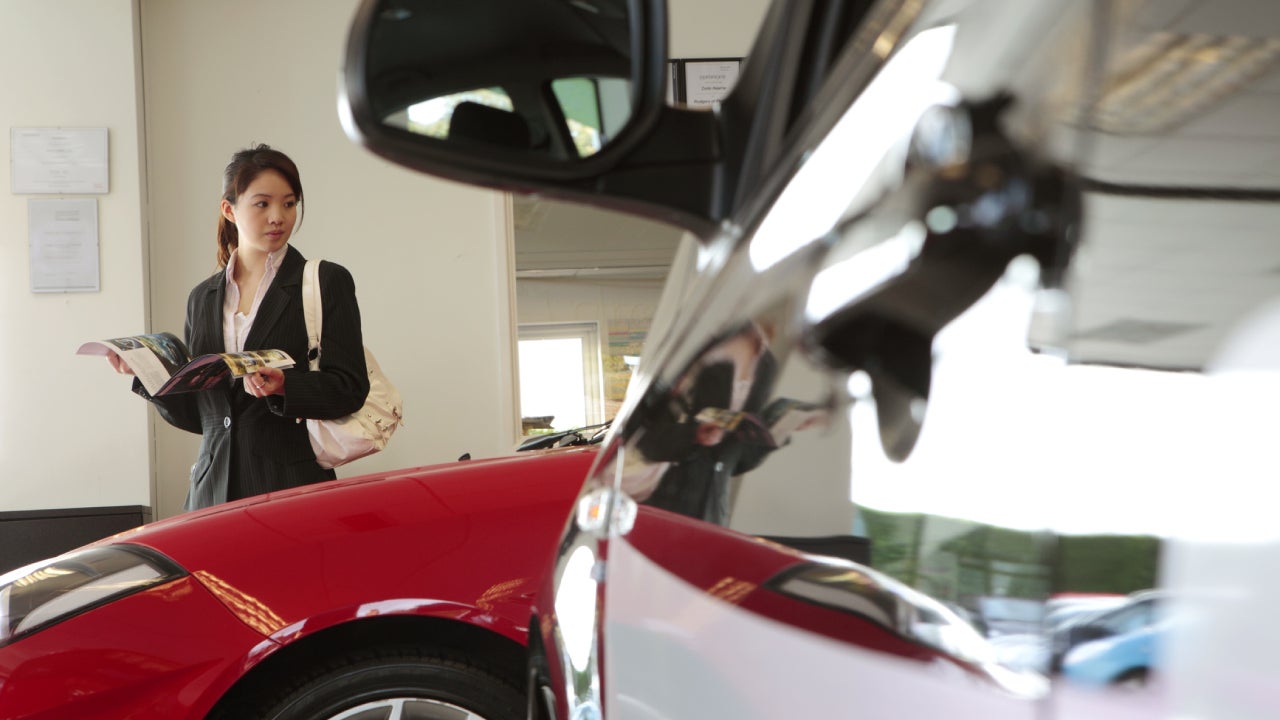Can I add a car to my insurance that is not in my name?




A car insurance policy is typically tied to the owner of the vehicle, but what if you need to insure a car that isn’t registered in your name? While this situation is uncommon, it does happen, and it can create complex legal and financial challenges for all involved.
Whether you’re driving a friend’s or family member’s car or have been gifted a vehicle under another person’s ownership, it’s the legal owner’s responsibility to insure it.
That said, there are a handful of situations when adding a vehicle you don’t own to your policy is possible. Additionally, there are specialized policies that provide non-owner car insurance, which might be beneficial for you depending on your situation.
Can I insure a car that is not in my name?
Generally, no, you cannot insure a vehicle you do not own. To establish if a car belongs on your policy, carriers will initially focus on two fundamental requirements: Who has insurable interest, and who has care, custody and control of the vehicle. While the concepts sound similar, the slight difference can cause a car to be accepted or rejected by your insurance company.
What is insurable interest?
Because auto insurance may pay for damage to your vehicle, as well as damage you cause to another driver’s vehicle (depending on the type of coverage you have), you must have what is called insurable interest in the vehicle. In terms of auto insurance, an insurable interest means that you could experience monetary loss if the vehicle is damaged.
Your insurance carrier isn’t likely to specifically ask you if you have an insurable interest in the vehicle. However, they will ask you if the car is registered to you. If you say yes, then insurable interest is generally assumed. If you say no, your agent will usually ask a few more questions to establish who has care, custody and control of the car.
What does care, custody and control mean?
This line of questioning helps carriers understand the level of risk associated with the car and potential drivers. In this case, your agent will probably directly ask you who has care, custody and control of the vehicle, meaning:
- Care: Who will maintain the car?
- Custody: Whose home will the car be kept at? Who has primary possession of the vehicle?
- Control: Who is responsible for allowing access to the car?
If you are responsible for maintaining, repairing or replacing the vehicle, even if you aren’t the registered owner, you may have insurable interest in the car. And here is where things can get a little murky.
When policyholders present carriers with situations that are outside typical underwriting guidelines, it could be an indication of fraud. A recent Reddit post is the perfect example of how easy it is to find yourself in this situation:
“I have Progressive. My dad lives in another state than me and is asking me if I can put his car under my insurance, using my name and not his. I feel bad saying no, but would this even be legal?”
From these details, it sounds like the poster doesn’t have insurable interest in the vehicle. If they lied about having care, custody and control of the vehicle, their carrier could cancel the entire policy for material misrepresentation.
Determining who has care, custody and control of a vehicle helps insurance carriers discover cases of rate evasion, also known as rate skipping, which is one of the most common types of insurance fraud. Rate skipping is when drivers misrepresent information, such as who has access to the car or where it is garaged, to secure lower rates.
Coverage options for vehicles not registered in your name
For the most part, a car that is owned by you and kept at your primary residence is insurable by you. A car that is not owned by you or is kept at a different location is not able to be added to your auto policy. Common situations where you can typically insure a vehicle not in your name include:
- A vehicle is registered only in your spouse’s name, and they live in the same household as you.
- A vehicle is registered only in your child’s name, and they live in the same household as you.
- A vehicle is co-owned between you and your child, but your child took the car with them to college.
- A vehicle is registered only in a family member’s name, and they are considered a household resident, such as your parent or sibling.
However, several situations fall into a gray area. Note that state laws regulating title and registration may impact whether a car can be insured by someone who does not own the vehicle.
Roommates
Most carriers will require all household members with a driver’s license to be listed as a driver on your policy. Depending on a carrier’s guidelines, if the other drivers have their own auto insurance, they can be listed as a non-driver or excluded from the policy, which usually doesn’t impact your insurance rates. While too many non-related individuals in one household may raise some red flags, many carriers will allow roommates to share an insurance policy.
One thing to keep in mind is that there can only be one named insured. So you may be the only one with the authority to make policy changes or cancel the policy. Your roommates would be relinquishing control over key responsibilities of owning a car.
Co-owned vehicles with non-family members
If you agree to co-sign for an auto loan for a non-family member, you may also be listed as a co-owner on the title. If the co-owner does not live with you, you can’t usually insure the car on your policy. Instead, you would send proof of insurance to the co-owner’s insurance company, and they would list you as having other insurance. This way, your driving record wouldn’t impact the co-owner’s insurance rates.
Vehicles of elderly parents
At some point, elderly parents may no longer feel comfortable driving due to their age or health. They may decide to keep their car so that you or a caregiver can provide them with transportation. In this case, you may be able to add the vehicle to your policy if it is kept at your residence. If not, you may be added as the primary driver to their policy. This situation will vary by insurance carrier.
Vehicles of adult children
Adult children moving back home to live with their parents is increasingly common. Usually, they can add their car to their parents’ policy even if their parents don’t own the vehicle. This may be a smart way for families to save money by gaining a multi-car discount. However, if the adult child does not live in the household, they would need to get their own policy.
Private sales with written payment agreements
You may find yourself agreeing to take possession of a vehicle and make payments to the owner over time with a private seller, similar to “buy here, pay here” dealerships. How this situation differs is that the seller may require payment in full before they sign the title of the car over to you. This situation can get tricky, but some carriers will allow you to add the car to your policy after they receive a copy of the written agreement.
Gifted vehicles
Perhaps your parents or grandparents just purchased a new car and have agreed to give you their old vehicle as a gift. They may offer to keep the vehicle insured, but is that the correct way to handle the situation?
It likely depends on your living situation and age. If you still live in the same household as your parents (or whoever gave you the vehicle) and you are a minor, you may be able to keep the vehicle insured on your parents’ policy and add yourself as a driver.
However, if you are a legal adult and live in a different location, you will likely need to get your own auto insurance policy.
Company-owned vehicles
If you work for a company that has given you a vehicle to drive, the car still needs to be insured. Typically, your employer will be the owner of the vehicle, meaning that you have no insurable interest in it. You will likely be added to your employer’s business auto insurance policy as a driver. You are not able to take out a personal auto policy on a corporate vehicle that you do not own.
However, if you own a business and purchase a company vehicle, you may need to add a business use endorsement to your policy or purchase business auto insurance coverage. Depending on how the vehicle is used, it may need to be insured as a business auto rather than a personal one.
Disadvantages of insuring a car not in your name
Just because you may be able to add a car to your insurance that isn’t in your name, doesn’t mean you necessarily should. Several potential drawbacks may occur which would have long-term effects on your personal finances if the situation goes awry:
- Adds confusion to the claims process: When an auto insurance claim is paid, funds disbursed by the insurer for the vehicle’s damage are paid to the insurance policyholder, even if they don’t own the vehicle.
- Title and registration issues: In some states, the car insurance must match the vehicle title or registration. If the paperwork doesn’t align, the owner of the other car could wind up with a license suspension if the state thinks they are driving uninsured.
- Lack of control over coverage selections: While comprehensive and collision coverage and deductibles can vary across vehicles, the other policy coverage types can not. All vehicles on a policy have the same liability limits, which may or may not work for the owner of the other vehicle.
- Added risk and higher premiums: When you add a driver to your policy, you assume the risk they may cause. If they cause an accident that exceeds the limits of your policy, you may be on the hook to pay the difference out of pocket. In addition, their driving activity could impact the rate of the entire policy, not just their vehicle.
Frequently asked questions
Why we ask for feedback Your feedback helps us improve our content and services. It takes less than a minute to complete.
Your responses are anonymous and will only be used for improving our website.
You may also like

Do you need insurance to buy a car?

Can you get insurance with a suspended license?

Do you need insurance to register a car?

Can you get car insurance without a license?


